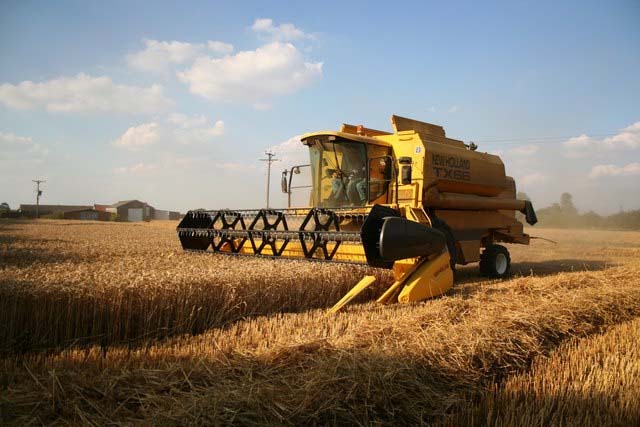
The NFU is urging the public to help turn around a decline in self-sufficiency that means the UK produces just 62 per cent of its own food.
August 14 is the day when British food supplies would run out if all the food produced in Britain in a year was stored and eaten from January 1. The NFU is launching a Charter looking for the public, politicians and food industry to sign, pledging their support.
Evidence demonstrates that the will is there. A One Poll survey has revealed that 78 per cent of consumers thought supermarkets should stock more British food and 42 per cent said they were more likely to buy more traceable food produced on British farms. And farmers are ready to rise to the challenge to produce more food sustainably.
NFU President Peter Kendall said the decline in self-sufficiency in many sectors should be a warning signal that something is wrong.
“To think that today’s date would signal the time when our domestic food supply runs out is frankly alarming”, said Mr Kendall. “It says to me that we must act.
“As an industry we have had a challenging decade but the realisation has dawned that as a nation we can’t simply go around the world chasing the cheapest deal for our food.
“So, instead we need to look closer to home. Right across the board farmers have a fantastic natural capacity to produce more British food, given the right market signals and the confidence to invest. We have the right technologies to produce more from less with precision farming helping to target fertiliser and crop protection products within centimetres. Laser technology can even pinpoint an individual weed, improving accuracy and efficiency. Crops grown under cover help to lengthen the season for our British fruits. But there is more to do to empower our farmers to enable them to make the most of our natural resources and feed our growing nation.
“I want to know our government is really getting to grips with its food vision and ensuring that sustainable, productive farming is across all government departments. Let’s create an environment which really means farming businesses can invest. Let’s address market failure and iron-out volatility to enable the entire food chain to grow supply.
“We have all learned the lessons of long, complex supply chains and retailers are all telling me that they want to work with British farmers to ensure their shelves are stocked with more British produce. We currently import around £37.6bn of food and drink. We are a trading nation but at a time of economic uncertainty a strong food producing industry is essential.
“Consumers are increasingly showing their support for British farming and are our best ally. I would ask to them to continue showing their support by demanding of their local supermarket, restaurant, or MP - what are you doing to Back British Farming?
“I couldn’t agree more with the Prime Minister David Cameron when he said last week that ‘farmers are the backbone of Britain’. I am immensely proud of British farming, and I urge everyone that cares about British food to sign our pledge being launched today to ensure this British industry thrives.”
The National Pig Association has thrown its weight behind the Back British Farming Charter launched today by the National Farmers Union, which calls for shoppers, food companies and politicians to help reverse the decline in the nation’s food self-sufficiency.
“Around 60 percent of the pork products we eat in this country — including bacon, sausages and ham — are imported through sometimes tortuous supply chains,” said NPA general manager Zoe Davies.
“With a bit of encouragement, our pig farmers could be persuaded to gently step up production and the whole country will benefit as a result.”
British pig farmers delight their customers in many ways:
EATING QUALITY — Most pig farm staff receive continuous specialist training in how to ensure the animals they look after are stress-free, which in turn means tender, better-tasting pork.
SHORTER SUPPLY CHAINS — Food companies selling British pork and pork products can trace their products back to their farms of origin, giving consumers added confidence in the food they buy.
REAL WELFARE — Over 90 percent of British pigs benefit from quarterly visits by specialist pig vets, who check and record a range of welfare indicators recommended by animal scientists.
COUNTRYSIDE ECONOMICS — Pig farms make a huge contribution to the countryside as they employ more staff than many forms of agriculture and are also significant users of local trades and suppliers.
BALANCE OF PAYMENTS — In many parts of Britain pig farms have all but disappeared, so there is plenty of scope for the nation to reduce its dependance on imports of the world’s favourite meat.
FOOD SAFETY — The recent Horsegate scandal showed that consumers cannot always trust convoluted supply chains from overseas suppliers and that short local supply chains are best.
FOOD SECURITY — Most forecasters see global food supplies tightening over the years ahead and the time will come when Britain has to rely much more on its own food resources, just as it had to during the Second World War.
A recent One Poll survey has revealed that 78 percent of consumers want supermarkets to stock more British food.
“As an industry we have had a challenging decade but the realisation has dawned that as a nation we can’t simply go around the world chasing the cheapest deal for our food,” according to NFU president Peter Kendall.
“So, instead we need to look closer to home. Right across the board farmers have a fantastic natural capacity to produce more British food, given the right market signals and the confidence to invest.”
